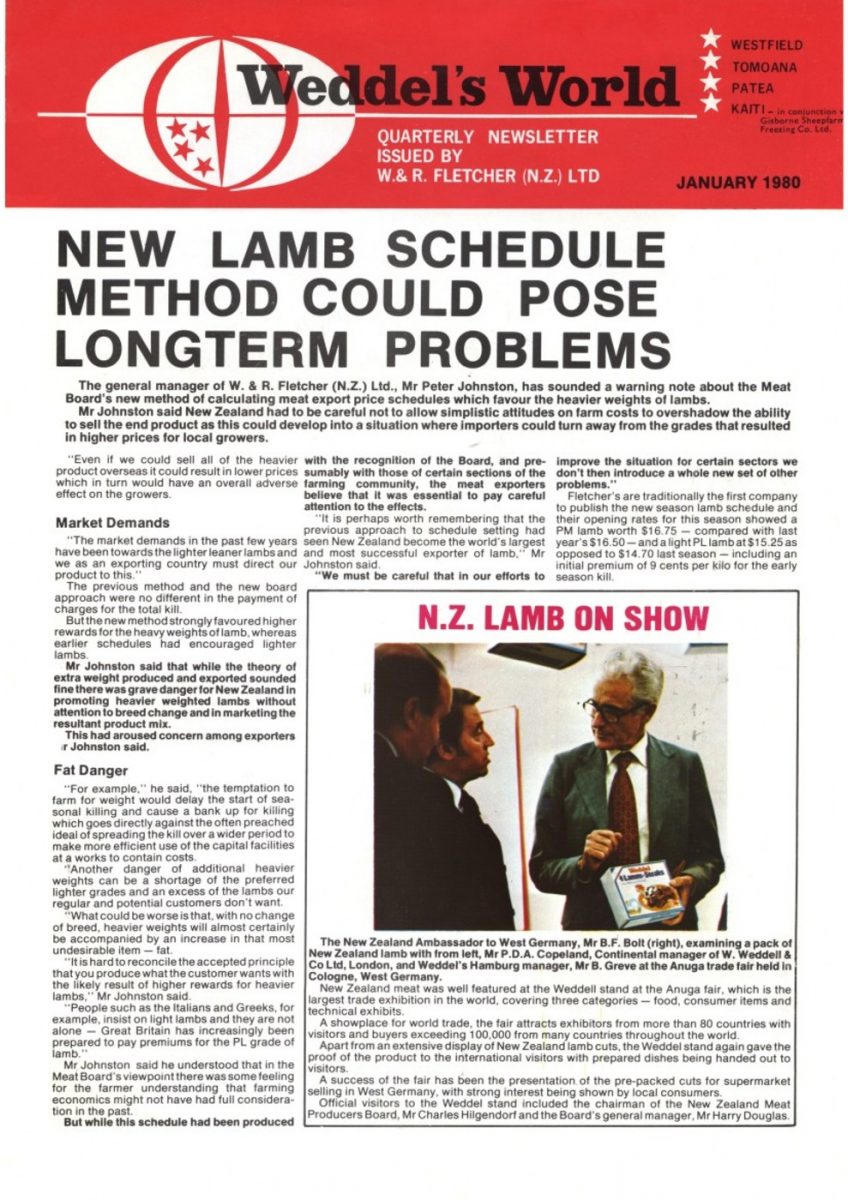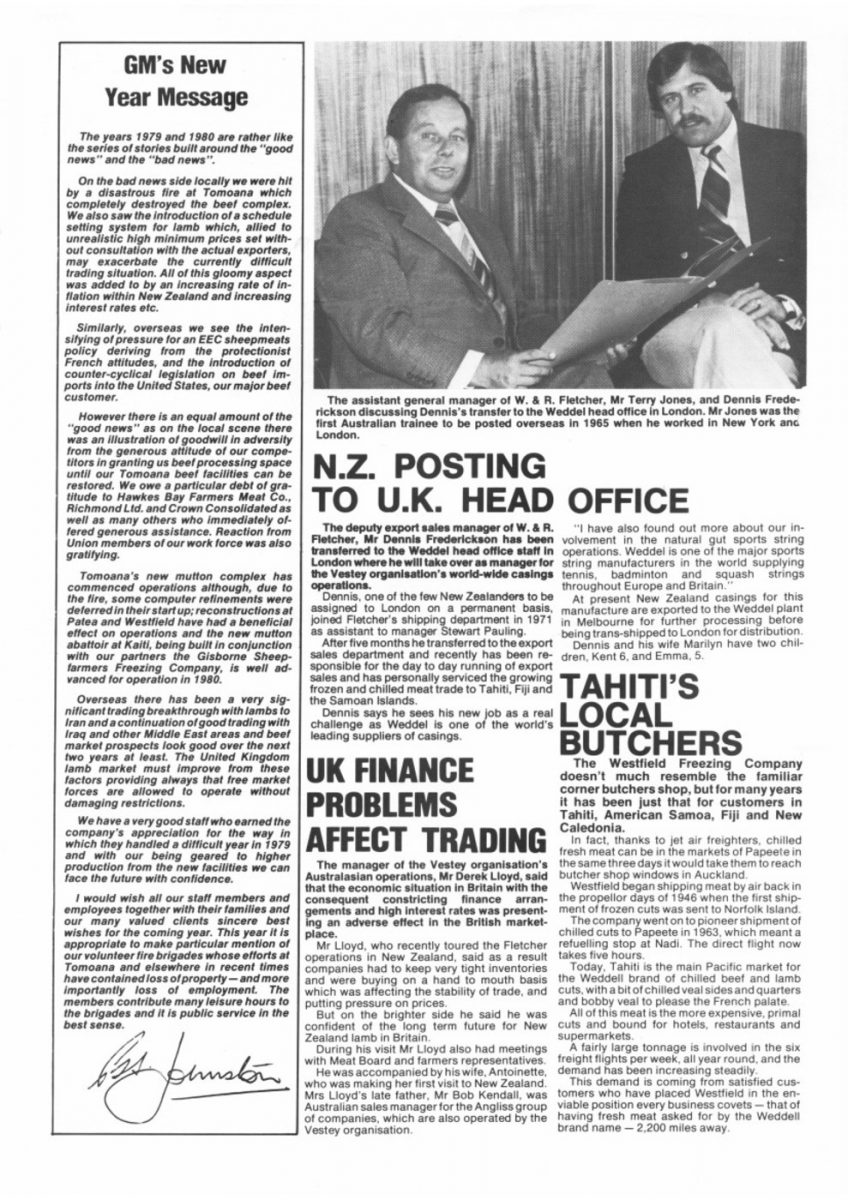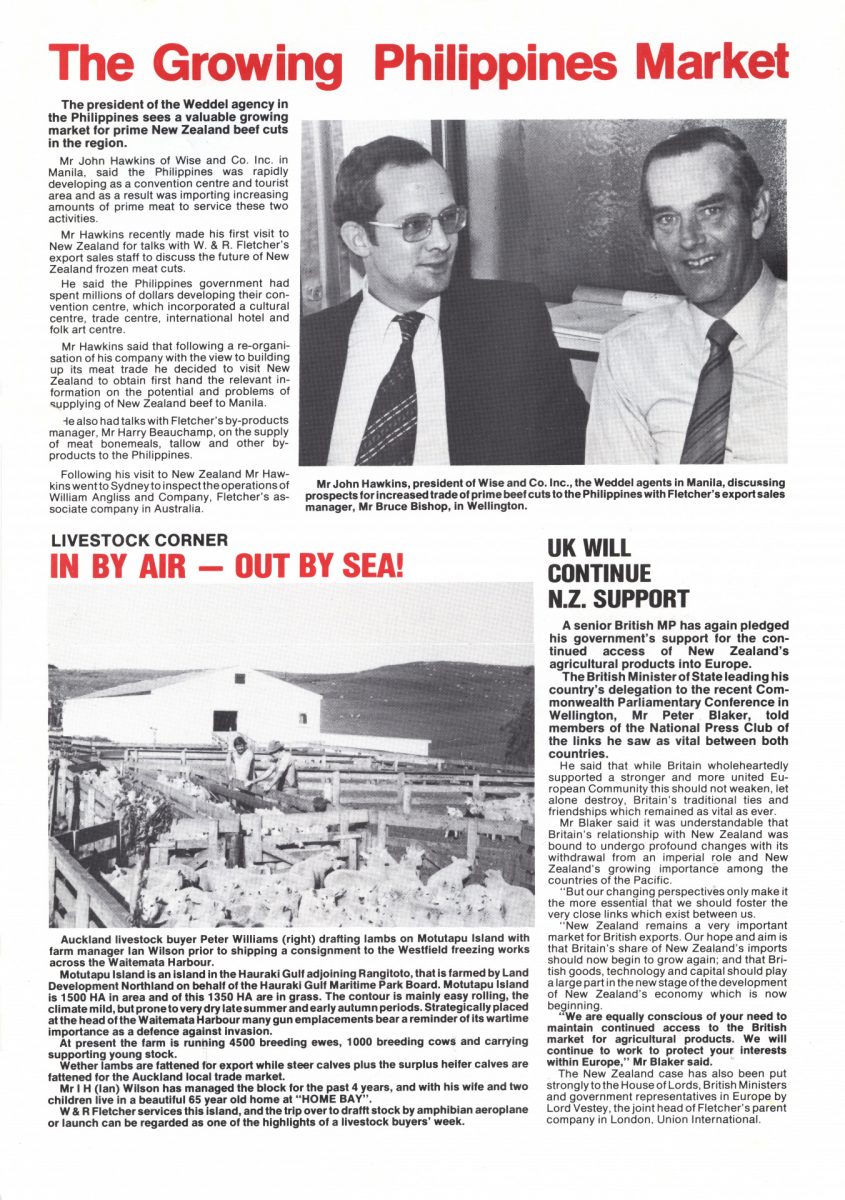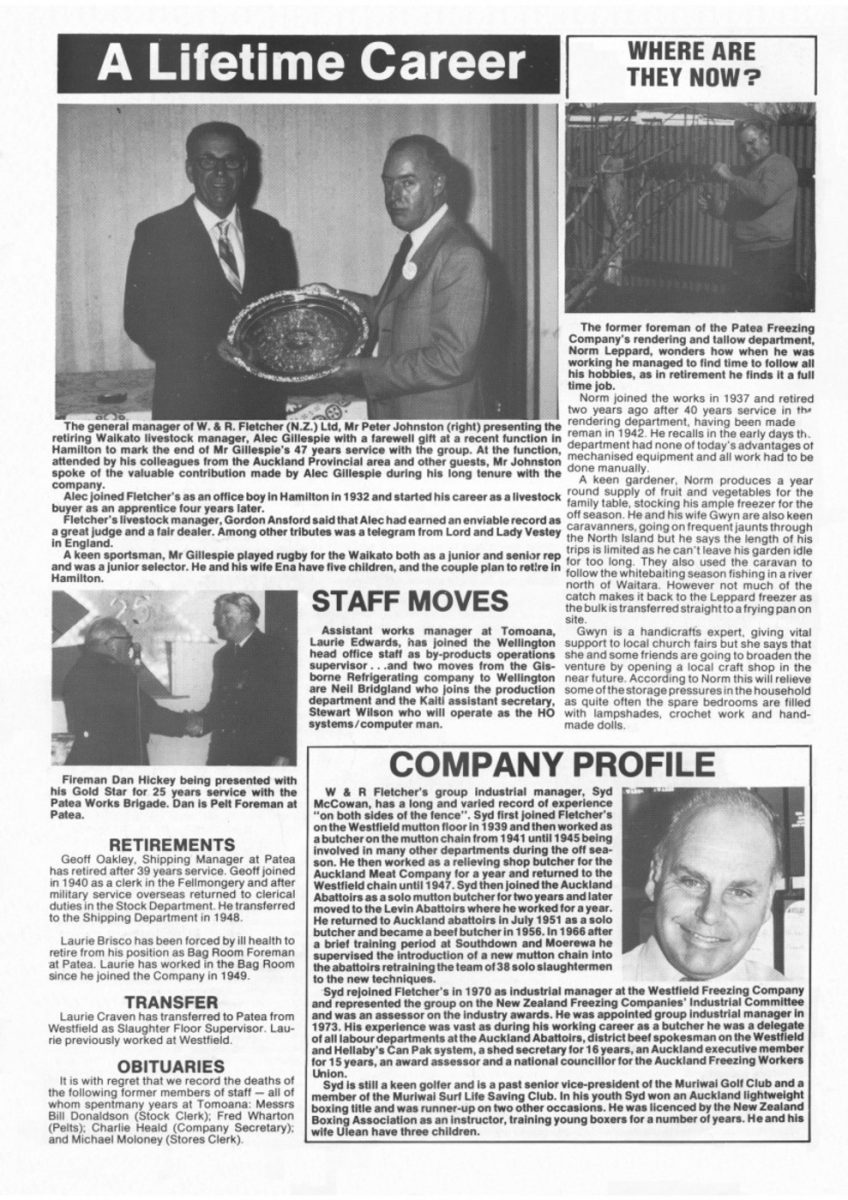GM’s New Year Message
The years 1979 and 1980 are rather like the series of stories built around the “good news” and the “bad news”.
On the bad news side locally we were hit by a disastrous fire at Tomoana which completely destroyed the beef complex. We also saw the introduction of a schedule setting system for lamb which, allied to unrealistic high minimum prices set without consultation with the actual exporters, may exacerbate the currently difficult trading situation. All of this gloomy aspect was added to by an increasing rate of inflation within New Zealand and increasing interest rates etc.
Similarly, overseas we see the intensifying of pressure for an EEC sheepmeats policy deriving from the protectionist French attitudes, and the introduction of counter-cyclical legislation on beef imports into the United States, our major beef customer.
However there is an equal amount of the “good news” as on the local scene there was an illustration of goodwill in adversity from the generous attitude of our competitors in granting us beef processing space until our Tomoana beef facilities can be restored. We owe a particular debt of gratitude to Hawkes[Hawke’s] Bay Farmers Meat, Richmond Ltd. and Crown Consolidated as well as many others who immediately offered generous assistance. Reaction from Union members of our work force was also gratifying.
Tomoana’s new mutton complex has commenced operations although, due to the fire, some computer refinements were deferred in their start up; reconstructions at Patea and Westfield have had a beneficial effect on operations and the new mutton abattoir at Kaiti, being built in conjunction with our partners the Gisborne Sheepfarmers Freezing Company, is well advanced for operation in 1980.
Overseas there has been a very significant trading breakthrough with lambs to Iran and a continuation of good trading with Iraq and other Middle East areas and beef market prospects look good over the next two years at least. The United Kingdom lamb market must improve from these factors providing always that free market forces are allowed to operate without damaging restrictions.
We have a very good staff who earned the company’s appreciation for the way in which they handled a difficult year in 1979 and with our being geared to higher production from the new facilities we can face the future with confidence.
I would wish all our staff members and employees together with their families and our many valued clients sincere best wishes for the coming year. This year it is appropriate to make particular mention of our volunteer fire brigades whose efforts at Tomoana and elsewhere in recent times have contained loss of property and more importantly loss of employment. The members contribute many leisure hours to the brigades and it is public service in the best sense.
P. Johnston
The assistant general manager of W. & R. Fletcher, Mr Terry Jones, and Dennis Frederickson discussing Dennis’s transfer to the Weddel head office in London. Mr Jones was the first Australian trainee to be posted overseas in 1965 when he worked in New York and London.
N.Z. POSTING TO U.K. HEAD OFFICE
The deputy export sales manager of W. & R. Fletcher, Mr Dennis Frederickson has been transferred to the Weddel head office staff In London where he will take over as manager for the Vestey organisation’s world-wide casings operations.
Dennis, one of the few New Zealanders to be assigned to London on a permanent basis, joined Fletcher’s shipping department in 1971 as assistant to manager Stewart Pauling.
After five months he transferred to the export sales department and recently has been responsible for the day to day running of export sales and has personally serviced the growing frozen and chilled meat trade to Tahiti, Fiji and the Samoan Islands.
Dennis says he sees his new job as a real challenge as Weddel is one of the world’s leading suppliers of casings.
“l have also found out more about our involvement in the natural gut sports string operations. Weddel is one of the major sports string manufacturers in the world supplying tennis, badminton and squash strings throughout Europe and Britain.”
At present New Zealand casings for this manufacture are exported to the Weddel plant in Melbourne for further processing before being trans-shipped to London for distribution.
Dennis and his wife Marilyn have two children, Kent 6, and Emma, 5.
UK FINANCE PROBLEMS AFFECT TRADING
The manager of the Vestey organisation’s Australasian operations, Mr Derek Lloyd, said that the economic situation in Britain with the consequent constricting finance arrangements and high interest rates was presenting an adverse effect in the British marketplace.
Mr Lloyd, who recently toured the Fletcher operations in New Zealand, said as a result companies had to keep very tight inventories and were buying on a hand to mouth basis which was affecting the stability of trade, and putting pressure on prices.
But on the brighter side he said he was confident of the long term future for New Zealand lamb in Britain.
During his visit Mr Lloyd also had meetings with Meat Board and farmers representatives.
He was accompanied by his wife, Antoinette, who was making her first visit to New Zealand. Mrs Lloyd’s late father, Mr Bob Kendall, was Australian sales manager for the Angliss group of companies, which are also operated by the Vestey organisation.
TAHITI’S LOCAL BUTCHERS
The Westfield Freezing Company doesn’t much resemble the familiar corner butchers shop, but for many years it has been just that for customers in Tahiti, American Samoa, Fiji and New Caledonia.
In fact, thanks to jet air freighters, chilled fresh meat can be in the markets of Papeete in the same three days it would take them to reach butcher shop windows in Auckland.
Westfield began shipping meat by air back in the propellor days of 1946 when the first shipment of frozen cuts was sent to Norfolk Island.
The company went on to pioneer shipment of chilled cuts to Papeete in 1963, which meant a refuelling stop at Nadi. The direct flight now takes five hours.
Today, Tahiti is the main Pacific market for the Weddell brand of chilled beef and lamb cuts, with a bit of chilled veal sides and quarters and bobby veal to please the French palate.
All of this meat is the more expensive, primal cuts and bound for hotels, restaurants and supermarkets.
A fairly large tonnage is involved in the six freight flights per week, all year round, and the demand has been increasing steadily.
This demand is coming from satisfied customers who have placed Westfield in the enviable position every business covets that of having fresh meat asked for by the Weddell brand name – 2200 miles away.















Do you know something about this record?
Please note we cannot verify the accuracy of any information posted by the community.